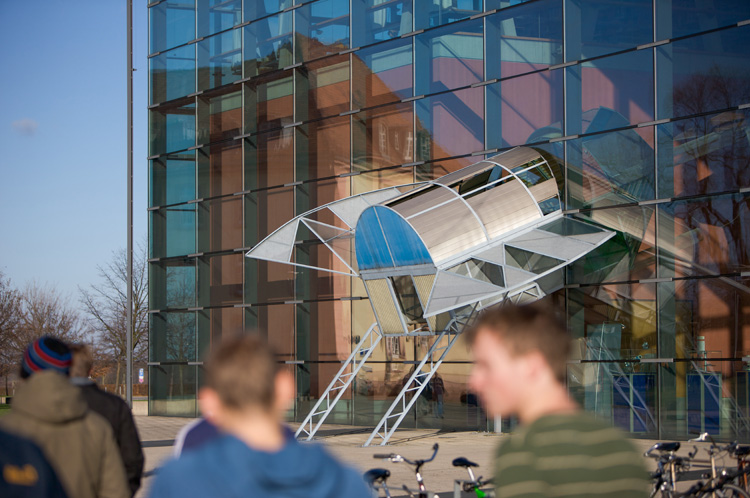Achieving study goals through self-reflection
Freiburg, Sep 24, 2021
“Studienziele. Selbstreflektiert. Erreichen” or SSE-Kompass for short is a service for Freiburg students on the Sustainable Systems Engineering degree program which the donors’ association and the Baden-Württemberg Foundation have awarded 30,000 euros. Developed by an engineer and an expert in Teaching and Learning in Higher Education from the university, the teaching concept addresses the numbers of drop-outs from technical degree programs.

Learning autonomously and reflecting on one’s studies and goals: this skillset can help to reduce high numbers of drop-outs from technical degree programs. Photo: Peter Mesenholl
High numbers of drop-outs are a serious concern to all, especially if they are from a degree program at the Department of Sustainable Systems Engineering (INATECH) where sustainability is at the heart of everything they do. According to a study by the German Academy of Science and Engineering (acatech), around 50 percent drop out of engineering degree programs. And up to 84 percent of them drop out in the first academic year, as shown by surveys conducted by the University of Freiburg into the start of studies. But why do students give up? Is it because they are disappointed because in the first two semesters they have to focus on engineering science principles before they can build sustainable systems? Or is it because many of them fail the examination in the first year and lose motivation? Questions like this indicate there is a need to talk. “It’s important to address these questions and give students an overview of where they are right now and what their career prospects are,” says Silke Weiß from the Centre for Teaching and Learning at the University of Freiburg.
Permanent part of the degree program
Working together, Prof. Dr. Frank Balle from INATECH and Silke Weiß developed SSE-Kompass with the aim of preventing high numbers of drop-outs. SSE stands for both the subject ‘Sustainable Systems Engineering’ and the aim: ‘Studienziele. Selbstreflektiert. Erreichen’ - literally Study goals. Self-reflected. Achieve. The concept was launched in 2019 with the SSE study course, one year after the Bachelor’s degree program was introduced at the Faculty of Engineering. The donors’ association and the Baden-Württemberg Foundation have awarded the teaching concept the Tandem Fellowship, which brings with it 30,000 euros. Competition was hot: around 180 applications were received from across Germany, only 17 were selected. “The announcement was an incentive to develop and refine the idea of Kompass. We’re very proud to have won the award. It gives us the momentum to extend it from a module tied to the semester into one that operates at all times,” says Frank Balle.
In the coming semesters, individual events will be piloted and experiences gathered and evaluated with the aim of making SSE-Kompass into a permanent part of the degree program.
Research, politics, industry
While it is compulsory for all students, SSE-Kompass does not add to the material on the degree program. Experiences at INATECH and the Centre for Teaching and Learning have shown how important it is to learn autonomously and reflect on one’s studies and objectives. Options on technical degree programs are multifarious and respond to a changing jobs market. “Students are free to go into politics, industry, the economy or an NGO. Or they can continue to study and do a Master’s degree and go on to research,” lists Frank Balle.
Students receive continuous feedback
The study course (SSE)² in the second semester and reflective workshops in the third and fifth semesters enable constant guidance of students, and they receive continuous feedback about their progress. On (SSE)² teachers offer insights into the subject by giving lectures on topics of research, introducing areas of research and application, casting light on the complex field of technology and sustainability, and presenting careers. Students are familiarized with didactic elements of group work and large group methods, using a roadmap they can structure their own studies and reflect on the material and their understanding of the subject in a study diary. Results are developed into podcasts, a quiz or interviews.
In the last semesters teaching took place largely online on account of the corona pandemic. Frank Balle and Silke Weiß have learned to treasure the benefits of digital teaching spaces for small student groups. Dialogue between students and teachers is as important here as the exchange of ideas within the peer group. It challenges students to change their perspective and independently acquire new knowledge in this way.
Annette Hoffmann

